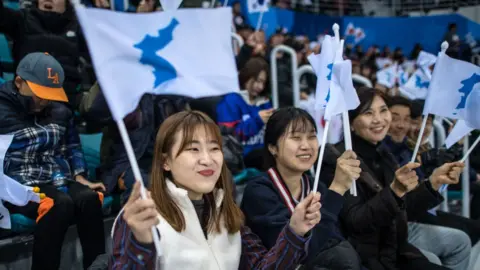Winter Paralympics: North Korea to send team following talks
 Getty Images
Getty ImagesNorth Korea will participate in the Winter Paralympic Games in Pyeongchang, according to South Korea's news agency.
The two countries have been discussing North Korea's involvement at the border village of Panmunjom.
The decision follows the North's participation in the Olympics, widely seen as successful piece of diplomacy which brought a hint of rapprochement.
However, countries like the US and Japan remain wary of nuclear-armed North Korea's intentions.
It will be the first North Korean delegation to attend a Winter Paralympics.
Only two athletes, both para skiers, have been invited to take part in the Games, which will be held from 9-18 March.
But North Korea last month agreed that it would send a 150-strong delegation, including cheerleaders and support staff.
On Tuesday morning, officials from both Koreas met on the northern side of the demilitarised zone, according to Seoul's unification ministry.
They were expected to discuss the events North Korea's athletes will compete in, as well as travel and accommodation plans for the North's delegation.
Lee Joo-tae, who is leading South Korea's delegation at the talks, earlier told reporters they would do their best to maintain the current atmosphere for improved inter-Korean relations, the Yonhap news agency reports.
North Korea sent a controversial senior general, Kim Yong-chol, to the closing ceremony of the Olympic Games on Sunday.
He also met South Korea's President Moon Jae-in and, according to South Korea, said North Korea would be willing to reopen talks with US officials.
The US had said such talks could lead to a "brighter path", but has insisted that North Korea giving up its nuclear weapons must remain the end goal.
Meanwhile, South Korea's foreign minister said sanctions on Pyongyang were only intended to pressure the country into giving up its nuclear ambitions.
"Sanctions are not an end in themselves and not meant to bring down North Korea but to make it understand that its future lies not in nuclear weapons but in working with the global community towards de-nuclearlisation," Kang Kyung-wha told the UN in Geneva on Tuesday.
The Korean peninsula has been divided since the 1950-53 war and the two sides have never signed a peace treaty.
